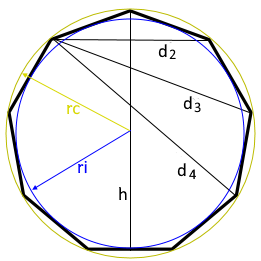Nonagon (9-gon) Calculator
Calculator and formulas for regular nonagons
Nonagon Calculator
Regular Nonagon
A regular nonagon has 9 equal sides and 9 equal interior angles (140°). Divisible by 3 → triple symmetry.
Regular Nonagon

The diagram shows a regular nonagon with all relevant parameters.
All 9 sides are equal in length, all interior angles measure 140°.
Properties of a regular nonagon
A regular nonagon (enneagon) shows special mathematical properties:
- 9 equal sides: All side lengths are identical
- 9 equal angles: Each interior angle measures exactly 140°
- Sum of angles: 7 × 180° = 1260°
- Divisible by 3: 9 = 3² - special symmetry
- Central angle: 360°/9 = 40° per segment
- Construction: Complex geometric construction
The nonagon and the triple relationship
The regular nonagon benefits from its relationship to the number 3:
3² properties
- 9 = 3² (square of 3)
- Triple rotational symmetry possible
- Can be subdivided into 3 triangles
- Connection to trigonometry
Symmetry properties
- 9-fold rotational symmetry
- 3-fold sub-symmetry
- Mirror symmetries in 9 axes
- Harmonic angle distribution
Construction and trigonometric properties
The regular nonagon presents special constructive challenges:
Classical construction
- Constructible with compass and straightedge
- Angle trisection required
- Central angle: 360°/9 = 40°
- Complex trigonometric relationships
Trigonometric values
- sin(20°) ≈ 0.342
- cos(20°) ≈ 0.940
- tan(20°) ≈ 0.364
- Algebraic expressions possible
Applications of the regular nonagon
Regular nonagons find special applications:
Architecture & sacred buildings
- Churches and chapels (9-sided floor plan)
- Pavilions and round buildings
- Decorative windows and rosettes
- Historical structures
Art & design
- Islamic ornamentation
- Mandala designs
- Modern art installations
- Graphic design and logos
Games & entertainment
- Strategy games with 9-sided fields
- Puzzles and brain games
- Board game elements
- Dice games (rare 9-sided dice)
Science & technology
- Crystallography (rare 9-fold symmetry)
- Optical systems and apertures
- Rotationally symmetric components
- Sensor arrays and detectors
Formulas for the regular nonagon (enneagon)
Area A
With sin(40°) ≈ 0.6428
Perimeter P
Simple: 9 times the side length
Diagonal d₂ (short)
Shortest of the three diagonal types
Diagonal d₃ (medium)
With sin(60°) = √3/2
Diagonal d₄ (long)
Longest of the three diagonal types
Circumradius rₐ
With sin(20°) ≈ 0.342
Inradius rᵢ
With tan(20°) ≈ 0.364
Height h
Sum of circumradius and inradius
Calculation example for a nonagon
Given
Find: All properties of the regular nonagon
1. Calculate basic measures
Perimeter and area
2. Radii and height
Radii and height
3. All three diagonals
The three different diagonal lengths
4. Complete summary
Complete characterization of the regular nonagon
The regular nonagon: Triple harmony
The regular nonagon stands as an example of harmonic geometric proportions that arise from the special relationship to the number 3. As 3² = 9, it unites the properties of three- and nine-divisions in an elegant geometric system.
The power of nine: 3² and its significance
The number 9 as the square of the sacred number 3 gives the nonagon special properties:
- Triple symmetry: Can be subdivided into three identical 120° sectors
- Nine-division of the circle: 360°/9 = 40° - harmonic angle division
- Trigonometric elegance: Connection to sin(20°), cos(20°), tan(20°)
- Cultural significance: 9 as a number of completion in many cultures
- Mathematical beauty: Three diagonal types in harmonic proportions
Constructive geometry and classical problems
The nonagon is connected to classical geometric problems:
Angle trisection
The construction of the nonagon is closely related to the trisection of the right angle. The 30° angle must be divided into three 10° parts.
Gaussian constructibility
According to Gauss, the regular nonagon is constructible with compass and straightedge, since 9 = 3² is a power of a Fermat prime.
Algebraic aspects
The trigonometric values for π/9 are algebraic numbers that can be represented as solutions of cubic equations.
Practical construction
Despite theoretical constructibility, practical execution requires very precise angle divisions or numerical approximations.
Applications in art, architecture and technology
The nonagon finds diverse practical applications:
- Sacred architecture: Chapels and central buildings with 9-sided floor plans
- Islamic art: Complex ornamentation based on 9-fold division
- Modern architecture: Pavilions and round buildings for special aesthetics
- Industrial design: Rotationally symmetric components with 9-fold division
- Optics: Aperture systems and aperture designs
- Game design: Strategy games with 9-field structures
Mathematical elegance and formulas
The mathematical relationships in the nonagon show special elegance:
Trigonometric values
The values sin(π/9), cos(π/9) and tan(π/9) are solutions of third-degree algebraic equations and show the connection to cubic algebra.
Area ratios
The area ≈ 6.182 · a² shows interesting numerical properties and is related to the golden ratio φ.
Diagonal ratios
The three diagonal types stand in harmonic relationships to each other and form an elegant geometric system.
Practical calculations
Despite algebraic complexity, all practically relevant values can be calculated numerically with good precision.
Summary
The regular nonagon embodies the mathematical beauty that arises when powers of small primes are geometrically manifested. As 3², it unites the mystical meaning of three with the completion of nine. Its practical constructibility and elegant trigonometric relationships make it a fascinating object of study between classical geometry and modern mathematics. In architecture and design, it offers a rare but harmonious alternative to the usual polygon forms and demonstrates the timeless connection between mathematical theory and aesthetic practice.
|
|